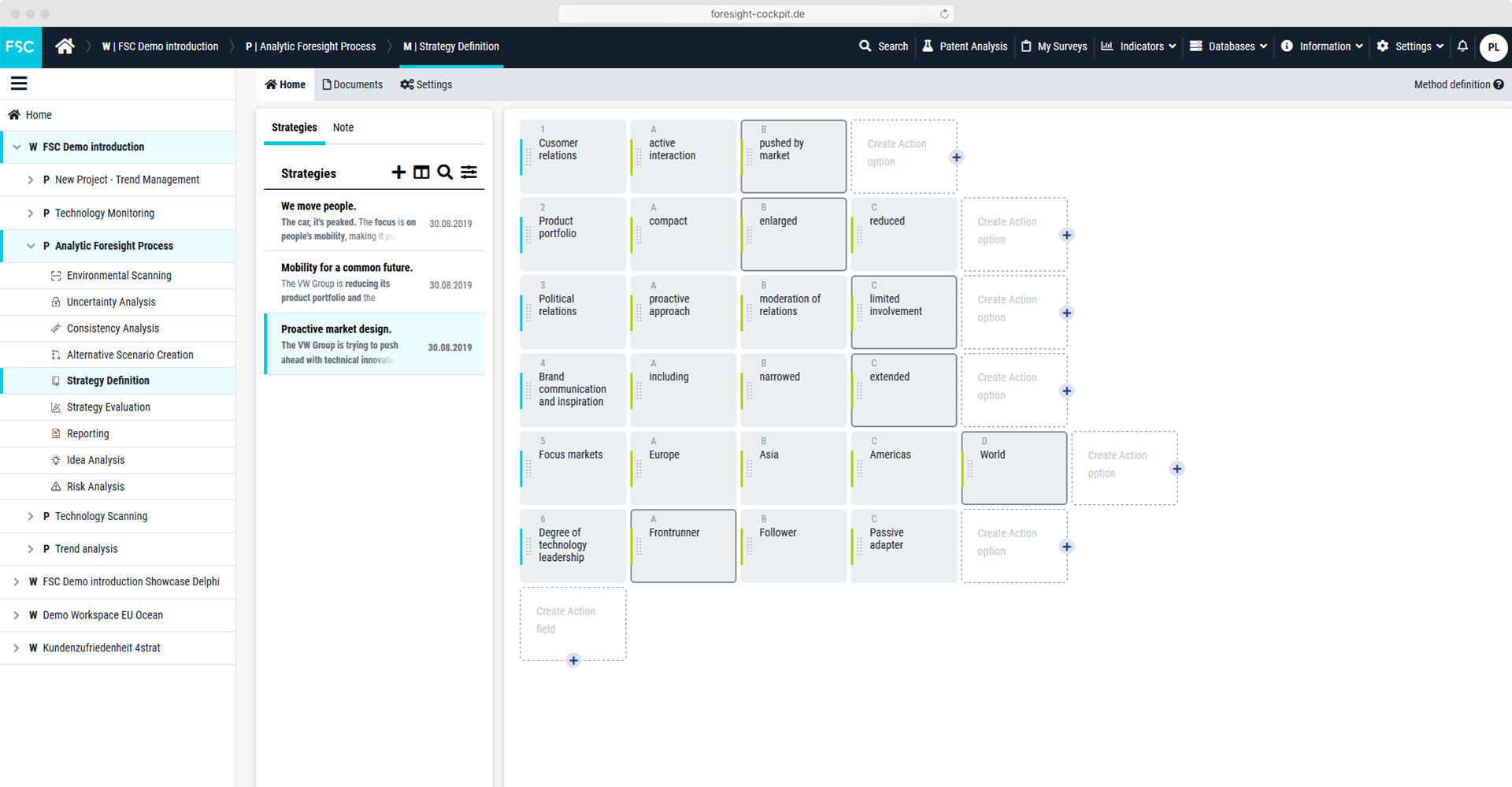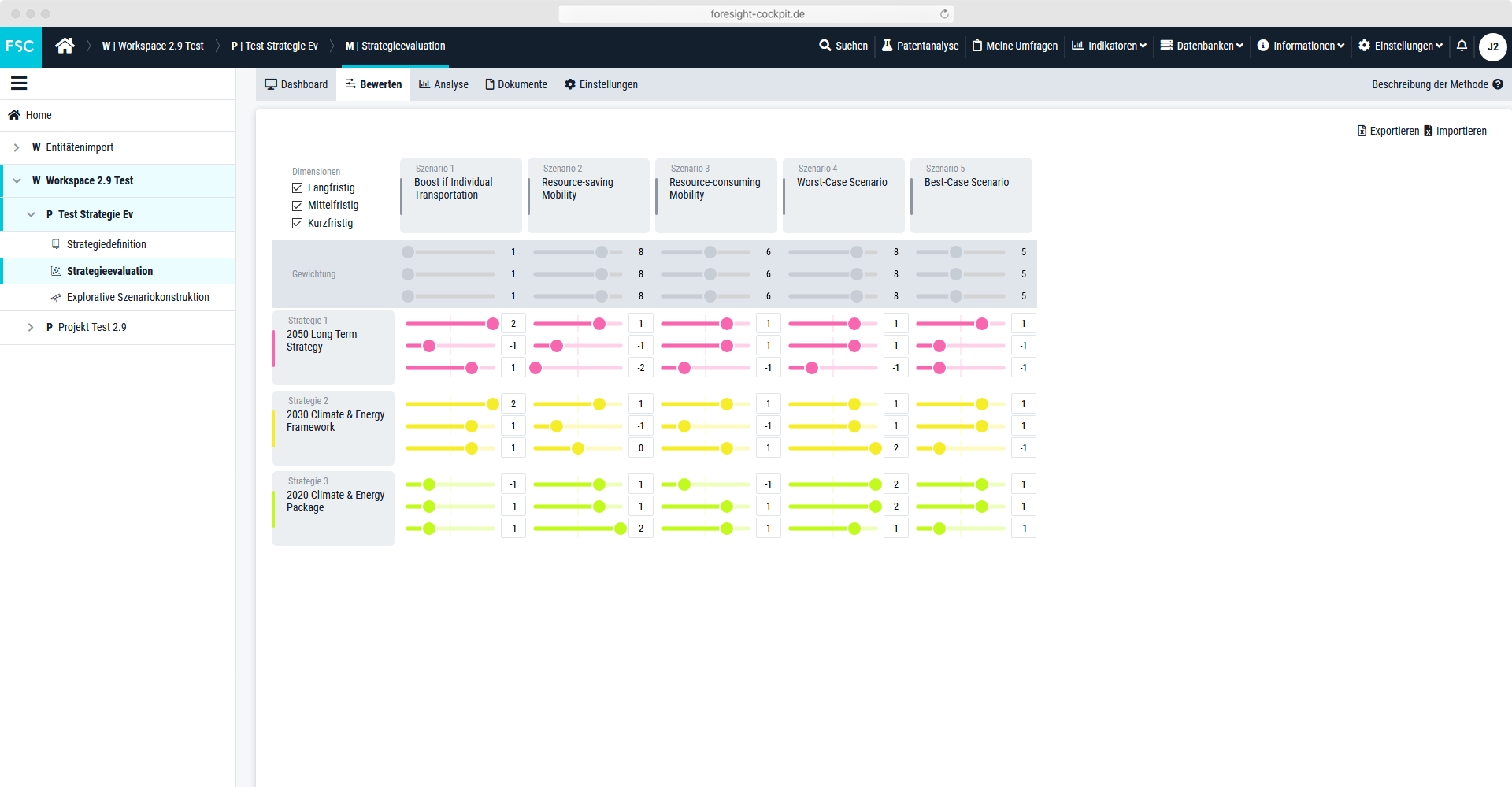Strategy Management
Our strategy management process
-
1Define goals and scenariosDefine your goals with the Goal-Assessment method and develop appropriate scenarios.
-
2Deriving fields of action and options for actionDerive suitable fields of action and their options.
-
3Create strategiesCreate and discuss different strategies in a team.
-
4Evaluate the strategiesCollaboratively evaluate the possible strategies against the objectives and scenarios at different time intervals.
-
5DecideUse different methods to decide which strategy is the best at what time.
-
6REPORTINGExport, share and publish the results with one click.
What is strategy management?
This is particularly relevant in VUCA environments (Volatile, Uncertain, Complex and Ambiguous) in which disruptions announce themselves with signals that are difficult or impossible to detect, but which have massive and unexpected effects due to systemic networking. By thinking about possible versions of the future today, you can recognize the course of the future early on.
The foresight strategy cockpit strategy management module
Define multiple strategies at once


Test your strategies in different scenarios
Further features
-
Strategy Definition
-
Strategy Evaluation
-
Decision Matrix
-
Link strategies with scenarios, trends, ideas, factors and risks
-
Manage, describe and edit strategies
Our values in short
-
Holistic Strategy Management
-
Recognize opportunities and risks to adapt your strategy
-
Browser Add-on and App for faster integration of relevant pieces of information
-
Automated Reporting functions for fast communication
-
Fully supported and trained by our Foresight experts
Designed for your team to create futures
Summary
Strategy management is the link between strategy, operations, and implementation planning. Every strategy follows a concrete goal - but companies are confronted with constantly and ever faster changing environments, posing increasingly higher demands on management and corporate strategy.
The more effectively you integrate the different levels and processes of the company into a holistic strategy prioritising long-term objectives, the better equipped they are for unexpected developments and changes. The management of these objectives must be part of the operational processes in the company as external and uncontrollable conditions are subject to change and difficult to predict.
Why one strategy isn’t enough?
Ensuring versatility when it comes to strategy formulation is vital to enable flexibility to react to a range of different scenarios an organisation may be faced with in the future. This allows managers to better react to changes and implement necessary strategic measures quicky. Different strategic objectives require different strategies for different scenarios: The more scenarios you can prepare for, the more robust your strategy management will be in times of disruption.
The market and competitor environment are characterised by an increased pace of disruption which means requirements and expectations are constantly changing – this is added to by exponential forces driving technological innovations and creating a challenging environment for the strategic management of any organisation.
The strategic significance, impact and potential of these developments must be continuously re-evaluated and reflected in a multifaceted corporate strategy. This is particularly relevant in VUCA (Volatile, Uncertain, Complex and Ambiguous) environments. These environments are often shaped by technological developments and innovations that are embedded in bigger systems resulting in a potential for wide-reaching and unexpected impacts.
Such drastic changes might disrupt or have a destructive effect on established business models. Making matters worse these changes are often impossible to anticipate and therefore require adaptive competencies in an organisation’s strategy management. The key to adaptability is to visualise a wide array different futures today in order to identify areas that can be actively shaped to use change for your own success.
The strategy management module has been designed to help you turn scenarios into success factors. Designing versatile and suitable strategic processes that are easily accessible will allow you to implement necessary measures all the more quickly.
In addition, our module enables you to adopt a cooperative approach to strategy evaluation at all levels of the company - assess possible strategies against different goals and scenarios for short-, mid-, and long-term horizons. Applying diversification techniques to your strategy creates a more future-proof approach and a potential to discover new opportunities that are easy overlooked in more one-dimensional strategies.
STRATEGY MANAGEMENT MODULE FOR HOLISTIC PROCESSES
Our strategy module within the Foresight Strategy Cockpit (FSC) facilitates the implementation of a multifaceted corporate strategy integrating all levels of your organisation. The FSC provides you with the right tool to do this digitally and efficiently allowing you to configure the different modules in line with your unique processes. The ability to be agile in a constantly changing market environment is a key success factor over the long term.
DIFFERENT SCENARIOS – ADAPTABLE STRATEGIES
The analysis of relevant factors that play a role for future developments should be integrated in a holistic and strategic management approach. This covers the evaluation of the current state of the company with regard to industry and market environment, as well as the corporate, vision, mission and policies. In addition, the strategic objectives should be viewed in interaction with anticipated technological developments that may have an impact on internal and external elements of your organisation. Formulating appropriate strategies that can account for a range of alternative future scenarios is vital for long-term planning. The results of these strategic analyses can be easily accessed through real-time reporting – allowing you to act to achieve your strategic objectives in a targeted and effective manner.
Frequently asked questions and answers
Strategy management software, like our Foresight Strategy Cockpit (FSC), provides companies with a tool to plan and implement their strategic objectives and actions in a structured, efficient, and future-proof manner. With such software, organizations can adapt to changing market conditions by developing agile and robust strategies that seamlessly integrate into their business operations. With our strategy management software, you have a tool at your disposal to help develop agile and robust strategies that can adapt to changing external and internal conditions.
In a fast-paced business world where changes occur constantly and often unexpectedly, it is essential for companies to have a clear yet flexible strategy. Strategy management software allows companies to plan ahead, simulate scenarios, and adjust their strategies accordingly. This enables them to respond to unexpected developments and secure competitive advantages.
The Foresight Strategy Cockpit combines various modules and processes to enable holistic strategy planning and implementation. It integrates qualitative and quantitative data, facilitates real-time team collaboration, and considers both internal company aspects and external market conditions. As a result, companies receive a powerful solution to be successful in an ever-changing market environment.
In addition to strategic planning and implementation, our Foresight Strategy Cockpit allows the integration of real-time data and expert knowledge, provides various data visualization options, and adheres to the highest security standards. With modules such as trend management and scenario construction, companies can reduce uncertainty in a rapidly changing world.
A strategy is a structured plan that contains a series of actions to achieve a desired outcome. A holistic approach to strategy management that includes elements to mitigate adverse consequences of possible future developments also minimises risks. Integrating aspects that allows for the capitalisation of opportunities as well as risk mitigation creates strategies that are suitable to achieve long-term objectives whilst also dealing with ever-increasing challenges effectively.
A strategic analysis of all factors relevant for future developments enable an organisation to develop specific goal-oriented measures that should guide decision-making at all levels and be continuously adjusted as needed. Establishing a holistic strategy management requires systemic understanding of an organisation. Being guided by high-level objectives facilitates consistent decision-making at all levels of the organisation. Regularly evaluating the most suitable strategies against a variety of different future scenarios can become a key factor for the success of your organisation.
A strategic analysis of all factors relevant for future developments enable an organisation to develop specific goal-oriented measures that should guide decision-making at all levels and be continuously adjusted as needed. Establishing holistic strategy management requires systemic understanding of an organisation. Being guided by high-level objectives facilitates consistent decision-making at all levels of the organisation. Regularly evaluating the most suitable strategies against a variety of different future scenarios can become a key factor for the success of your organisation.
The greater the challenges an organisation faces when it comes to new developments and technological innovations - the more flexible your corporate strategy must be. An approach to strategy management that accounts for different scenarios can turn challenges into opportunities and can be the key when it comes to achieving your organisation’s objectives. Strategy management goes beyond following a rigid corporate strategy as it builds on continuous re-evaluation of the status quo allowing you to anticipate challenges early, react quickly, and reduce risks. Preparing for a range of different scenarios increases the likelihood to be able to use future developments to capitalise on opportunities.
The management of an organisation not only requires the day-to-day operative business but also long-term planning and risk management activities to ensure strategic objectives can be met. Companies are confronted with constantly changing environments, posing increasingly higher demands on management and corporate strategy. These environments are often shaped by technological developments and innovations that need to be managed to reduce a company’s risk exposure and to ensure success in the long term. Therefore, it is necessary to design measures that form different strategies for a variety of scenarios, which are difficult to predict. This is not about formulating a single corporate strategy, but rather a set of different strategies that should be integrated in a holistic risk and strategy management. In this way, an increased need for risk minimisation in the face of quickly changing developments can be integrated with day-to-day operational decision-making.




